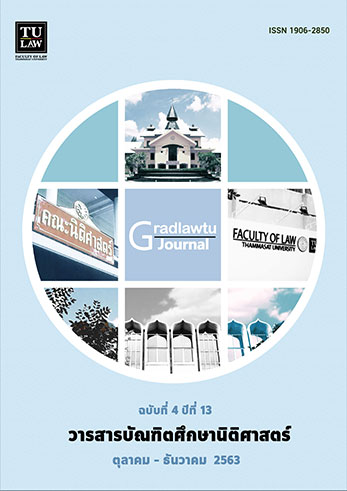การบูรณาการบทบาทการค้นหาความจริงของศาลกับระบบการดำเนินคดีอาญาของไทย
บทคัดย่อ
บทคัดย่อ
ระบบการดาเนินคดีอาญาของไทย ตามประมวลกฎหมายวิธีพิจารณาความอาญาเป็นระบบแบบผสม ระหว่างระบบกล่าวหาและระบบไต่สวนที่พัฒนาขึ้นในกลุ่มประเทศภาคพื้นยุโรปโดยใช้ประมวลกฎหมายวิธีพิจารณาความอาญาของประเทศแอฟริกาใต้เป็นต้นแบบนั้น แต่ปรากฎข้อเท็จจริง เชิงประจักษ์ในทางสังคมว่าในทางปฏิบัติของการค้นหาความจริงในชั้นพิจารณาคดี ศาลนาระบบกล่าวหามาใช้เป็นหลัก ส่วนระบบไต่สวนนามาใช้เป็นข้อยกเว้นเท่าที่จาเป็นเท่านั้น ทาให้เกิดประเด็นปัญหา “ความสับสนในระบบกฎหมายในส่วนของการดาเนินคดีและการค้นหาความจริง” ว่าประมวลกฎหมาย วิธีพิจารณาความอาญาของไทยเป็นระบบไต่สวน หรือระบบกล่าวหา หรือระบบผสม ซึ่งความสับสนนี้ มีงานวิจัยหลายฉบับ ให้ความเห็นไปในทางเดียวกันว่า เป็นเรื่องของประมวลจริยธรรมตุลาการที่เกิดจาก ผู้ยกร่างนาแนวคิดระบบกฎหมายอังกฤษที่มีอิทธิพลต่อระบบศาลไทยมาอย่างยาวนาน มากาหนดเป็นแนวทางปฏิบัติในทางอรรถคดี ทาให้เกิดทัศนคติของผู้พิพากษามีบทบาทการค้นหาความจริงของตนเองไปในทางในเชิงรับมากกว่าเชิงรุก และเป็นไปได้ว่าการที่ศาลไม่แสดงบทบาทเชิงรุก ตามกฎหมายบัญญัติห้อานาจไว้อย่างกว้างขวางเช่นนั้น อาจเกรงว่าจะถูกครหา หรือกล่าวหา จากคู่ความว่าวางตัวไม่เป็นกลาง จนนาไปสู่การถูกร้องเรียนผิดวินัยภายหลังได้ จากการศึกษาวิจัยพบว่าเหตุที่เกิดความสับสนในระบบกฎหมายดังกล่าว เป็นเรื่องของการนาระบบการดาเนินคดีอาญาและระบบการค้นหาความจริง มาใช้อธิบายปะปนกันว่าเป็นเรื่องเดียวกัน อีกทั้งการแบ่งระบบการดาเนินคดีอาญาและระบบการค้นหา ความจริง ก็เป็นเพียงมุมมองทางทฤษฎีในรูปแบบแบบดั้งเดิมในอดีตที่ผ่านมา ซึ่งปัจจุบันไม่มีประเทศ ส่วนใหญ่ใดในโลกใช้ระบบกล่าวหา หรือระบบไต่สวนอย่างใดอย่างหนึ่ง โดยเพียงลาพัง และในเหตุผลทานองเดียวกันก็ไม่พบประเทศส่วนใหญ่ใดในโลก กาหนดบทบาทการค้นหาความจริงให้เป็นหน้าที่ ของศาล หรือคู่ความ ฝ่ายใดฝ่ายหนึ่ง หรือแยกออกจากันโดยเด็ดขาด แต่ต่างปรับตัวเข้าหากันเป็นระบบผสมทั้งสิ้น กล่าวคือ ใช้ระบบการดาเนินคดีอาญา แบบกล่าวหา คือ แยกการสอบสวนฟ้องร้องออกจากการพิจารณาพิพากษา ส่วนระบบการค้นหาความจริงขึ้นอยู่บริบทภายในของแต่ละประเทศ ว่าบทบาทการค้นหาความจริงในชั้นพิจารณาคดีนั้นให้ศาล หรือคู่ความเป็นผู้มีบทบาททาหน้าที่ในการค้นหา ความจริงเป็นหลัก หรือเป็นรอง มากน้อยกว่ากันเพียงใด ส่วนประมวลกฎหมายวิธีพิจารณาความอาญาของไทย จากการศึกษาวิจัยได้ข้อสรุปว่า ระบบการดาเนินคดีอาญาเป็นระบบแบบกล่าวหา ที่แยกองค์กรการทาหน้าที่สอบสวนฟ้องร้อง โดยมีเจ้าหน้าที่ตารวจและพนักงานอัยการแบ่งหน้าที่และตรวจสอบถ่วงดุลซึ่งกันและกัน ออกจากองค์กรทาหน้าที่พิจารณาพิพากษาคดี ในขณะที่ระบบการค้นหาความจริง ก็เป็นระบบผสมผสานระหว่างกล่าวหาและไต่สวน โดยกาหนดให้คู่ความและศาล มีบทบาทการค้นหาความจริงในชั้นพิจารณาคดีร่วมกัน คือ เริ่มต้นให้คู่ความมีบทบาทหลักในการนาพยานหลักฐานของแต่ละฝ่ายมาสืบ ต่อหน้าศาลที่วางตนเป็นกลางตามแนวคิดระบบการต่อสู้ของคู่กรณี โดยก่อนสืบพยานมีการกาหนดภาระการพิสูจน์ หรือหน้าที่นาสืบให้โจทก์ต้องนาพยานหลักฐานมาสืบพิสูจน์ความผิดของจาเลย ให้เสร็จสิ้นก่อน จากนั้นให้สิทธิจาเลยนาพยานหลักฐานมาสืบภายหลัง ส่วนบทบาทของศาลแม้ว่ากฎหมายกาหนดให้มีอานาจบทบาทเชิงรุกในค้นหาความจริงด้วยตนเองอย่างกว้างขวางก็ตาม แต่ก็เป็นเพียงบทบาทรองซึ่งจะเกิดขึ้นภายหลังเมื่อคู่ความเริ่มทาหน้าที่สืบพยานแล้ว หาใช่เป็นเป็นบทบังคับศาลไม่ เหตุที่เป็นเช่นนี้เป็นเรื่องกรมร่างกฎหมายประสงค์ให้บทบาทค้นหาความจริงเช่นนี้ เป็นไปตามมติของรัฐบาลสมัยนั้น คือ ต้องคานึงระบบกฎหมายไทยในขณะนั้นเป็นหลัก และสอดคล้องกับกฎหมายและสภาวะบริบททางสังคมความเป็นอยู่ของประเทศไทย อย่างไรก็ดีการบูรณาการบทบาทการค้นหาความจริงของศาล ของงานวิจัยฉบับนี้ คือ การนาหลักการบริหาร ที่เรียกว่า 8 M's อันประกอบด้วยปัจจัย ได้แก่1.คน (Man) 2.เงิน (Money) 3.วัสดุ (Material) 4.การบริหาร (Management) 5.กฎหมายระเบียบแบบแผน (Manual) 6.ศีลธรรม หรือจริยธรรม (Morality) 7.แรงจูงใจ (Motive) 8.ทัศนคติ (Mindset) มาใช้
เพื่อนาไปสู่เป้าหมายของการปรับเปลี่ยนทัศนคติของผู้พิพากษา ด้วยการแก้ไขเพิ่มเติมประมวลจริยธรรม ข้อ 3 และ ข้อ 9 พร้อมกับประมวลกฎหมายวิธีพิจารณาความอาญาในส่วนของมาตรา 174, 161/1, 162, 173/1, 173/2, 175, 176 ซึ่งจะเป็นการเพิ่มประสิทธิภาพในการค้นหาความจริงของศาลในระหว่างพิจารณาให้แสดงบทบาทตามที่ควรจะเป็นมากขึ้น
คำสาคัญ : บทบาท, ทัศนคติ, การค้นหาความจริง
* บทความนี้เป็นส่วนหนึ่งของดุษฎีนิพนธ์ หลักสูตรปรัชญาดุษฎีบัณฑิต สาขาการบริหารกระบวนการยุติธรรม คณะนิติศาสตร์ มหาวิทยาลัยธรรมศาสตร์
* * ผู้พิพากษาหัวหน้าศาลเยาวชนและครอบครัวจังหวัดลาพูน. น.บ., น.ม. (จุฬาฯ), น.บ.ท., ป.บัณฑิตทางกฎหมายธุรกิจ(ม.ธ.) ป.กฎหมายมหาชน (ม.ธ. และ ส.ค.ก.), ป.กฎหมายสิทธิมนุษยชนระหว่างประเทศ มหาวิทยาลัยนอตติงแฮม สหราชอาณาจักร, กาลังศึกษาระดับปริญญาเอก สาขาการบริหารกระบวนการยุติธรรม คณะนิติศาสตร์ มหาวิทยาลัยธรรมศาสตร์ ภายใต้โครงการสร้างผู้เชี่ยวชาญทางการบริหารราชการศาลยุติธรรม
ดาวน์โหลด
เผยแพร่แล้ว
ฉบับ
ประเภทบทความ
สัญญาอนุญาต
บทความหรือข้อความคิดเห็นใด ๆ ที่ปรากฏในวารสารบัณฑิตศึกษานิติศาสตร์เป็นความรับผิดชอบของผู้เขียนบทความโดยเฉพาะ คณะนิติศาสตร์ มหาวิทยาลัยธรรมศาสตร์ และกองบรรณาธิการไม่จำเป็นต้องเห็นด้วย



